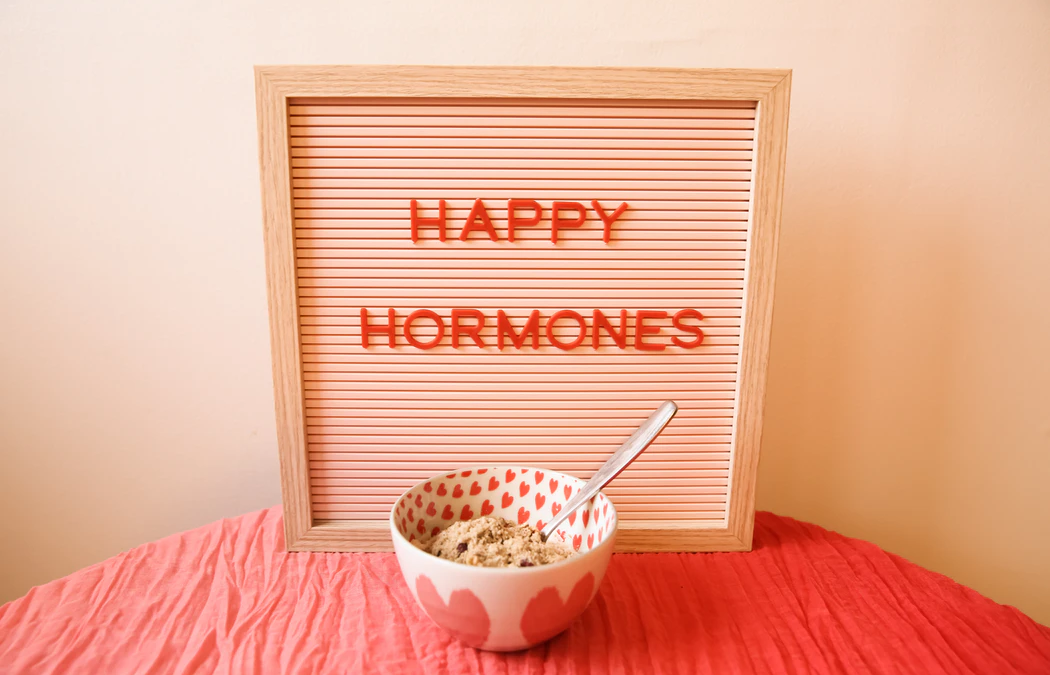Let’s face it, nothing is more frustrating for a woman than having her hormones out of whack. It can make life miserable premenstrually and during menstruation, and can make those dreams of becoming a mom feel so very far away. Join me on this journey to see how you can balance your hormones naturally!
Do you experience symptoms like PMS, heavy or irregular periods, or have been diagnosed or show symptoms of endometriosis or PCOS? Have you experienced infertility (or subfertility as I prefer to say)? Your blood sugar may not be the first thing that comes to mind to improve these symptoms and find balanced hormones, but if we dig deeper, we can see where these pieces all connect on our road back to health. It certainly isn’t the only factor, since our bodies are complex and bio-individual, but it can be a great place to start!
To start off, it would be helpful to know a bit about how our bodies regulate blood sugar. Our Central Nervous System (CNS) communicates with various parts of our bodies throughout the day to control our blood sugar. When we eat, our CNS signals our blood glucose level to rise causing our pancreas to release insulin. Insulin proceeds to take glucose out of the bloodstream and shuttle it where it needs to go for energy creation or for storage for future use.
When we are in a fasted state, our glucose levels drop. This causes the CNS to tell the liver to start creating glucose or releasing stored glucose to bring glucose levels back up. Our bodies are built to constantly repeat this pattern to keep our blood sugar within a healthy range.
Adrenals
Our adrenal glands are built to play a very minor role in blood sugar regulation. However when our bodies are constantly bombarded with high amounts of refined sugar or high amounts of stress, our adrenal glands end up kicking into overdrive. When blood sugar rises very rapidly (for example when you wake up and have that big cup of coffee with a sugary muffin on the side), our bodies will overproduce insulin to make up for it, causing our blood sugar level to then drop dramatically. Blood sugar crash sound familiar??
At this point the pancreas will release glucagon to bring it back up, BUT our adrenals will have to kick into high gear to release cortisol and adrenaline to help out since our bodies see this situation as an emergency, similar to a fight or flight response. Oftentimes our bodies end up doing this on a regular basis, since we then go on to repeat this process throughout the day, feeling that afternoon slump and then drinking another cup of coffee or having that sugary snack to bring our energy back up.
Sounds fascinating, but what does this have to do with balancing my hormones?
Well for starters, all of this work that the adrenals are taking on is depleting to our bodies. Over time the adrenals have a hard time keeping up and they end up “borrowing” from other parts of our body. One example of this is our friend pregnenolone. Pregnenolone is a hormone derived from cholesterol and is a precursor to the production of sex hormones like estrogens and progesterone, which are necessary for regulating our menstrual cycles and for ovulation and pregnancy, as well as other adrenal hormones. When the adrenal glands need help, they are able to “steal” nutrients like pregnenolone from the rest of the endocrine system.
When the body is under a lot of stress, like when it is constantly having to regulate large blood sugar crashes and rises, it determines that it is in a state of emergency and will “steal” the nutrients it needs to keep going. This means that our bodies will choose adrenal function as a priority over our menstrual cycle health and reproduction. Our bodies are made to adapt to be able to survive above all else!
Wow! So what can I do about this?
The important thing to remember here is that blood sugar regulation is a participatory process, meaning that the choices you make in your diet and lifestyle will impact how your body is able to regulate its blood sugar. A good place to start to balance your hormones naturally is eating a diet with a balance of macronutrients. Macronutrients are your protein, fat, and carbohydrates. Our bodies rely on healthy sources of all three macronutrients to keep a steady supply of energy throughout the day.
Healthy fats such as salmon, tuna, egg yolks, nuts and seeds, avocado, olives and olive oil, butter, coconut oil, and more are a great source of long burning steady energy. This way you can last several hours after a meal before you feel too hungry or tired (or hangry!) again.
Protein sources include quality meat, eggs, and dairy if tolerated and provide building blocks for many parts of our bodies, including hormone production.
Carbohydrates such as fruits, veggies, and grains provide quick-burning fuel for that fast energy boost.
Try working to find a balance of these on your plate at each meal and see how you feel! For example, try swapping out that coffee and muffin for breakfast for an egg, avocado, and a piece of fruit. Of course, we must keep in mind that each body is unique and it is important to find the foods that work best to support us.
A note on sugar
The current average intake of refined sugar in the United States is enormously higher than it has ever been before, with the average sugar intake per person rolling in at 150-200 pounds per year! A lot of this of course is in obvious food choices like pastries, sodas, and candies, but did you know that many of our packaged foods also have hidden sugars?
Check packages such as bread, pasta sauce, salad dressing, peanut butter, condiments, and more! Some will actually have “sugar” on the ingredients list, but oftentimes you will see them labeled as things like “high fructose corn syrup.” Words that end in “-ose” are things to watch out for and may be causing those spikes in your blood sugar. It may benefit your happy hormones to take a trip through your pantry to see what extra sugars you can eliminate. Then you can head to your local health food store and see what “no sugar added” alternatives you can find!
Done! What else can I do?
A good next step would be working to reduce and manage stress on our bodies. I know, I know, good luck trying to live in this modern world without stress. Trust me, I am right there with you. The key is to reduce the stress we are able to and learn to manage our stress that we are not able to eliminate. For starters, see if you can pay attention to not just what you eat, but how you eat. Try taking a few deep breaths before and taking time to actually sit down and enjoy your food rather than nibbling while you stare at a computer screen. This can help with stress levels as well as supporting healthy digestion.
Also, see if there are toxins in your environment that you can remove that may be adding to the total stress load on your body, such as the personal care and cleaning products you use around the house. In addition, see if you can make a good night’s sleep and adding some movement into your day a priority. Don’t let this become a chore, but find ways to move that are fun for YOU! Do you like to run or take walks? Do some gentle stretching while at the office? Dance around the house while you clean? Take a swim? This is all wonderful for your stress levels and for your body in so many ways and can help give you the space to be able to balance your hormones naturally.
Wishing you all the best in your happy hormones journey!
Ready to take the leap and finally get to the root cause of your hormone or endo symptoms? Click here to learn more about my 1:1 coaching program and apply today!
Other Articles You Might Enjoy:
The 5 WORST Foods for Endometriosis
The 5 BEST Foods for Endometriosis
Endometriosis, Toxins, and Your Kitchen
Toxins and Endometriosis Part 2: Cleaning and Personal Care
References:
Nutritional Therapy Association. (2021). Blood Sugar Student Guide [PDF document].
Student Guide – BSR – NTPO-Oct2020
Rizkalla, S. W. (2010). Health implications of fructose consumption: A review of recent data. Nutrition & Metabolism, 7, 82. hcp://doi.org/ 10.1186/1743-7075-7-82
Student Guide – BSR – NTPO-Oct2020
Harvard Medical School. (2018). Understanding the stress response: Chronic activation of this survival mechanism impairs health. https:// www.health.harvard.edu/staying-healthy/understanding-the-stress-response
Student Guide – BSR – NTPO-Oct2020
Stachowicz, M. & Lebiedzińska, A. (2016). The effect of diet components on the level of cortisol. European Food Research & Technology. 242: 2001. https:// doi.org/10.1007/s00217-016-2772-3
Student Guide – BSR – NTPO-Oct2020
Arble, D., Sandoval, D. (2013). CNS Control of Glucose Metabolism: Response to Environmental Challenges. Frontiers in Neuroscience. 7, 20. https://www.frontiersin.org/ar*cle/10.3389/fnins.2013.00020


